At lunchtime on Friday, 20 November we held a Christmas Market, showcasing our innovative creations and selling our rings to the college students
In term 4 2020, all year 7 pupils were divided into groups and charged with developing sustainable and creative goods to sell at the end-of-year Christmas Market.
We named our company Just Live because we wanted our clients to link it with serenity.
From the sale of our products, the total amount of money was calculated, we raised $1 953 which we donated to the College’s Service Learning partner organisation, The Salvation Army.
This term, we concentrated on economics. This was covered in Hass, English, and Innovate Ed. We learned about advertising, different sorts of customers and producers, supply and demand, and so on in economics. This learning culminated in us selling our items to the student population and profiting enough to contribute to charity.
This project required us to use the ASC fundamental skills to challenge our thoughts and explore new avenues of thought. We have to be well-organized, collaborative, innovative, curious, and communicative. These considerations aided in the creation of a creative business and pushed our boundaries in order to develop a product with our own unique spin.

This project required us to look outside the box by realising that economics is about what the customers want, not what we desire. I found this term for humanities tough since I had little prior understanding of economics, but as the term progressed, I utilised the ASC core qualities of organisation, inquisitiveness, and resilience to help me grasp economics better.
Later in humanities, we used what we had learned by playing skeleton island in class. The goal of the game was to gain money by competing with other purchasers and selling the same things. I was one of the five vendors in this game, and I based my prices on the economic notion of needs and desires. Cody and I were by far the greatest sellers in each round, but I ended up winning the game by asking exorbitant prices for the rarer products. This game taught me that by correctly pricing your things and keeping an eye on your competition, you can make a lot of money.

We used the design thinking method with our groups for innovative Ed. We began by pulling kids from several classes about presents, getting gifts, and what Christmas meant to them. The second stage of the design thinking process was to define, which required us to identify our customers’ requirements and desires. After we had empathised and defined, we went on to ideating, where we came up with several product ideas. We had some issues with the stage because all of our ideas were either not unique or had already been used. After a week of this step, we finally had our product of wire rings.
We had to next construct some practice rings for the prototype stage, which was one of the most difficult parts of the design thinking process because we had never made rings before. As we created additional rings, we improved, and by the time we had to present to our investors, we had some pretty high-quality rings. After creating various prototypes, we moved on to the testing phase, where we went around to different students and solicited feedback. Based on their input, we modified our strategy and created an even better product.
Before the market we were tasked to advertise our business, this meant we had to come up with an advertisement and innovative ways to spread the word about our business. My group made advertisements and placed them strategically around the school to attract the eye of our target consumers. By placing advertisements around the school we were able to attract our buyer’s attention so they would remember us on the market day.


The last step of the design thinking process was implemented, during which we developed our business and sold our items at the Christmas Market. This went well since we sold all of our items and our company functioned smoothly. It could have gone even better if we had prefabricated a few more bags because we needed to produce more as the market progressed, but our business was a success overall.
